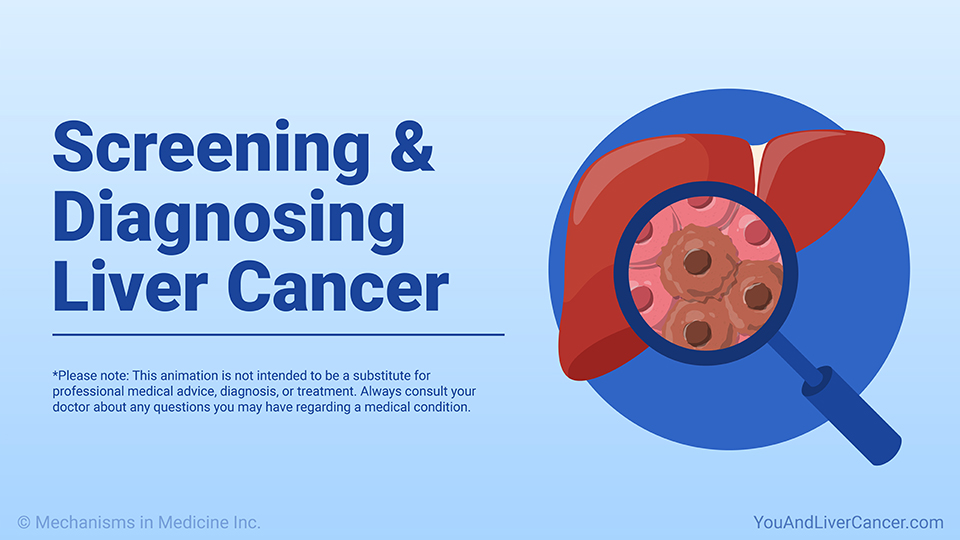Treating and Managing Liver Cancer
*Please note: This slide show is not intended to be a substitute for professional medical advice, diagnosis, or treatment. Always consult your doctor about any questions you may have regarding a medical condition.
Liver cancer treatment
There are many options for liver cancer treatment.
The most common type of liver cancer is
hepatocellular carcinoma, or
HCC.
1 This animation will focus on HCC treatment.
How do I find the right liver cancer treatment?
Your liver cancer treatment will depend on the cancer's size, location, and whether it has spread outside the liver.
The best treatment also depends on the health of your liver, your general health, and personal preferences.2
Which specialists treat liver cancer?
Your liver is indispensable to your body, and this makes treating liver cancer complex. Your treatment will probably involve multiple specialists.
These may include a liver specialist, or hepatologist; a cancer specialist, called an oncologist; a surgeon; an interventional radiologist, a radiation oncologist; members of a liver transplant team, and more.
Treatment options for early liver cancer that has not spread beyond the liver
For liver cancer at earlier stages that has not spread beyond the liver, your doctor may check the tumor regularly, surgically remove it, recommend a liver transplant, or recommend a local ablation.
How is surgery used to treat liver cancer?
Surgery may be the first step in your liver cancer treatment.
Depending on the cancer stage, a surgeon may be able to remove the liver tumors.
How is surgery used to treat liver cancer?
This surgery is called hepatectomy or liver resection. If only tumors are removed, you will still have liver tissue remaining.
Liver regeneration
The liver can regenerate, or regrow, tissue that is removed.3
If cancer has not spread outside the liver and the liver function permits, surgical resection may be the best option. The goal is to cure the cancer, but you need regular checkups to watch for recurrence.
The option of liver transplant
A liver transplant is an operation that removes the entire liver and replaces it with a whole or partial liver from a healthy donor. This might be someone who has died and donated their liver, or someone still living who gives part of their liver.
Is liver transplant for me?
Transplant may be a good option in some cases, particularly when the liver is otherwise ill.3 A liver transplant is intended to cure the cancer, and this treatment has the lowest chance of the cancer coming back.
Is liver transplant for me?
You need to live a healthy lifestyle and meet some requirements to be placed on the list for a new liver, and you must be healthy enough for the operation. Your doctor will let you know if transplant is an option. You can also get a second opinion.
Ablation for liver cancer
Ablation is another treatment for liver cancer if the cancer is small but not amenable to surgery. Doctors apply heat, cold, or electrical pulses directly to the tumor to destroy it.
Radiation for liver cancer
Precisely directed radiation therapy is another option. Radiation is targeted to the tumor while avoiding healthy areas of the liver.
Treatment options for cancer within the liver that cannot be treated with surgery
If cancer within the liver cannot be removed with surgery, you may have embolization, including chemoembolization or radioembolization. This blocks blood flow to the tumor, sometimes with
chemotherapy or internal radiation to kill tumor cells.
Systemic treatment for liver cancer that has spread through the liver or to other areas of the body
Other options are targeted therapy and immunotherapy.
Liver cancer may be treated with drugs that treat specific genetic changes, called targeted therapy, or drugs that help your immune system destroy cancer cells, called immunotherapy.
What if liver cancer comes back after treatment?
Liver cancer can come back after treatment. If so, your doctor will discuss treatment options with you.
Again, your options depend on your general health, liver health, previous treatments, and stage of cancer.
What if liver cancer comes back after treatment?
If the cancer cannot be cured, your doctor can help you choose treatments that relieve pain and discomfort and help you live as comfortably as possible. This is known as palliative care.
Consider liver cancer clinical trials
Clinical trials are research studies involving human volunteers. They help doctors find new tests and treatments, including for liver cancer. You can search for clinical trials by visiting Blue Faery's clinical trials finder tool at bluefaery.org or visiting ClinicalTrials.gov.
Consider liver cancer clinical trials
Joining a trial allows you to try treatments not yet available to the public. You may benefit, and information from the trial will benefit others in the future.
Ask your doctor about clinical trials as soon as you are diagnosed.
Take an active role in your care
No matter how your liver cancer is treated, it's important to play an active part in making decisions.
Sharing your goals for health and quality of life will increase your confidence during treatment. New drugs and treatments are constantly improving the outlook for liver cancer, so don't hesitate to ask questions.
References
- Asafo-Agyei KO, Samant H. Hepatocellular carcinoma. StatPearls. Last revised: June 12, 2023.
https://www.ncbi.nlm.nih.gov/books/NBK559177
- National Cancer Institute. Primary liver cancer treatment (PDQ) – Health professional version. Last revised: August 22, 2023.
https://www.cancer.gov/types/liver/hp/adult-liver-treatment-pdq
- Cleveland Clinic. Hepatectomy (liver resection). Last revised: April 29, 2022.
https://my.clevelandclinic.org/health/treatments/22930-hepatectomy-liver-resection
This slide show provides an overview of the
treatment and
management of
primary liver cancer or
hepatocellular carcinoma (
HCC)
. Your
liver cancer treatment will depend on the cancer's size, location, and whether it has spread outside the liver. The best treatment also depends on the health of your liver, your general health, and personal preference. Your liver is indispensable to your body, and this makes treating liver cancer complex. Your treatment will probably involve multiple specialists. Click through to learn about treatments including
surgery (
hepatectomy, or liver resection),
liver transplant,
ablation,
radiation,
embolization (including chemoembolization or radioembolization),
targeted therapy,
immunotherapy,
palliative care, and
clinical trials. No matter how your liver cancer is treated, it's
important to play an active part in making decisions. Sharing your goals for health and quality of life will increase your confidence during treatment. New drugs and treatments are constantly improving the outlook for liver cancer, so don't hesitate to
ask questions.
-
Share with family and friends:
Click here to take our SURVEY
Your feedback is important to us! We will use your feedback to develop future areas of content about liver cancer which will help other patients, caregivers, and families.

















































